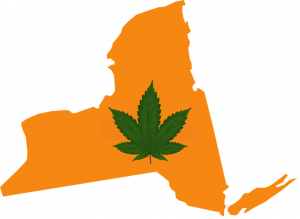New York’s Cannabis and Hemp Markets Exploded in 2022
By Andrew Kingsdale
December 23, 2022
Over the past year, unregulated cannabis and hemp-derived products became ubiquitous and conspicuous in New York. Yet at the same time, 2022 also was momentous for the growth of the Empire State’s regulated (legal) cannabis and cannabinoid hemp industries.
In February 2022 the state kickstarted New York’s supply-side market by creating adult-use conditional cultivation (AUCC) and adult-use conditional processor (AUCP) licenses. These conditional licenses, not originally part of the Marijuana Regulation and Taxation Act (MRTA) enacted last year, have since been awarded to over 250 in-state hemp cultivators to approximately 25 hemp processors, resulting in a ready supply of products for New York consumers.
Then in March 2022, New York’s newly-formed Cannabis Control Board (CCB) created another conditional license not found in the MRTA: the Conditional Adult-Use Retail Dispensary (CAURD) license. These licenses were made available to persons previously convicted of cannabis-related offenses (or their relatives). So far the CCB has issued 36 CAURD licenses, and is expected to issue approximately 100 more over the next few months.
Meanwhile the CCB and Office of Cannabis Management (OCM) have been busy promulgating “guidance” as well as proposing and approving regulations to govern the new adult-use cannabis, medical cannabis, and cannabinoid hemp markets.
For example, cannabinoid hemp regulations finalized licenses for cannabinoid hemp retailers and distributors, which cost only $300 per year and allow for the sale of a wide range of CBD products under New York law, including topicals, beverages, and inhalables. (Note: products containing cannabinoids created through isomerization, including Δ8-tetrahydrocannabinol and Δ10-tetrahydrocannabinol, may not be sold under cannabinoid hemp licenses.)
Other regulations have covered adult-use cannabis packaging, labelling, marketing, advertising, and laboratory testing, as well as personal home cultivation of medical cannabis. (Links to the regulatory packages can be found on OCM’s website here.)
On November 21 the CCB approved for publication in the State Register much-anticipated adult-use regulations regarding, among other issues:
- municipal rule-making, such as the extent to which municipalities may regulate the time, place, and manner of licensed cannabis operations (Part 119 of Chapter II of Subtitle B of Title 9 of the Official Compilation of Codes, Rules and Regulations of the State of New York);
- application and licensure eligibility and processes (Part 120);
- social and economic equity rules (Part 121);
- license-specific authorizations, requirements and prohibitions (Part 123);
- general business requirements and prohibitions (Part 124); and
- general operating requirements and prohibitions (Part 125).
All 282-pages of these proposed adult-use regulations can be found here, and public comments on them are due by February 13, 2023.
We estimate that once these regulations are finalized, the regulators will then start accepting applications, likely in the Spring or Summer of 2023. These non-conditional licenses will be good for two years before renewal.
The state has not set caps on the number of (non-conditional) licenses available. Nevertheless, retail dispensaries will be subject to setback requirements from schools, houses of worship, and community facilities.
Adult-use license types will include:
- Cultivation, including indoor, outdoor, mixed-light, or a combination of mixed-light with outdoor, with up to 100,000 square feet of canopy;
- Nursery;
- Processing, including manufacturing, extracting, packaging, labeling, and branding,
- Collectives, which may cultivate, process, and distribute according to cooperative principles;
- Distributors;
- Microbusiness, which are considered craft cultivators with vertical integration privileges;
- Retail dispensaries, which are brick and mortar but also may conduct delivery with up to 25 full-time or equivalent delivery employees, and have drive-thru service windows and pre-order customer pick-up lanes;
- Delivery, which can include by modes of trailer, bicycle, and motorcycle, and allow for carrying unsold goods that may be delivered during the course of making other pre-paid deliveries (the “ice cream truck model”); and
- On-site consumption lounges.
New York’s population and tourism position it to become one of the largest cannabis markets in the United States, and the world.
Furthermore, New York prides itself on taking a learned, progressive approach to building out its cannabis industry. Through the MRTA and regulations, the state positioned itself at the forefront of environmental, community, and social equity issues.
For example, the MRTA sets out a goal for 50% of the licenses to be awarded to “social and economic equity applicants” (Cannabis Law § 87.2.), and specifies that certain licenses (such as microbusinesses) are intended specifically to favor these applicants. The state intends to offer these applicants financial and training support, including through incubation programs and low interest or zero-interest loans.
Numerous opportunities abound for those willing to throw their hat into the ring with informed business plans and legal counsel guidance. We look forward to the further opening of these opportunities in 2023!
This information is provided as a public educational service and is not intended, nor should be construed, as legal advice. If you have specific questions regarding cannabis or hemp licenses in New York, please contact the Law Offices of Omar Figueroa at 212-931-0420 or newyork@omarfigueroa.com to schedule a confidential legal consultation.
The attorney responsible for this advertisement is Andrew Kingsdale. Prior results do not guarantee a similar outcome.

